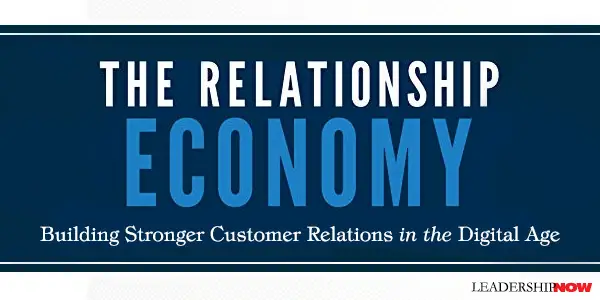 |
 |
11.15.19

The Relationship Economy
THE ONE SKILL that matters more than any other in leadership and life is the ability to connect with others. We generally learn this through example, but if those we emulated didn’t know how to do it (or its importance), we are at a disadvantage. It is, unfortunately, one skill that is rarely taught in any formal way. While technology has made connecting easier and more convenient it has also “changed the way we communicate, behave, and think,” writes John DiJulius in The Relationship Economy. This has led us to a “dramatic decline in our people skills. The pendulum has swung over to high tech and low touch.” A study by the Relational Capital Group revealed that 89 percent of senior leaders believe that relationships are the most important factor in their success year over year. However, the study also revealed that only 24 percent of those leaders actually do anything intentionally to promote building those relationships. Finally, the study further indicated that less than 5 percent of organizations actually have any specific strategies for helping the professionals develop and strengthen the relationships required to achieve their goals. That’s where DiJulius and The Relationship Economy come in. “The Relationship Economy is about building a culture that recognizes the importance of each individual and making everyone a part of a community that is working toward something bigger—a community that makes them feel cared for.” Hospitality entrepreneur Chip Conley said in a TED talk that “Almost 40 percent of us in the U.S. workforce have a boss that is younger than us and that number is growing quickly. Power is cascading to the young like never before because of our increasing reliance on digital intelligence. We are seeing young founders of companies in their early 20s scaling them up to global giants by the time they get to 30. And yet we expect these young digital leaders to somehow miraculously embody the relationship wisdom we older workers have had decades to learn. It’s hard to microwave your emotional intelligence.” We need a plan, and this is an easy place to start. After we meet someone, we can begin by learning at least two facts about their FORD—that is, their Family, their Occupation, their Recreation, or their Dreams. It’s not about grilling your customers and coworkers, but genuinely showing interest in them as part of the natural flow of conversation. Listening is a skill we need to develop. (Common and often unintentional mistake: “Never steal someone’s thunder. Suspend your own ego and let them enjoy their own story. This is a tough one for many because when someone brings up something that you have in common, you can get excited to share your experience.) DiJulius offers seven traits for effective communications and explores them throughout this book. You will also find ways to track interactions in your organization. 1. Compassion and Empathy — “Highly empathic people have an insatiable curiosity about strangers.” 2. Engagement and Warmth — Employees who love what they do put customers at ease. Smile. 3. A Drive to Serve — Focus on the customer and the experience they are having. How do they feel after their encounter with you? 4. Ownership — Acting with the same care as the owner of the company would. Do what it takes to ensure a happy customer. 5. Charitable Assumption — Always assume the best in people. 6. Presence — Be in the moment. Do not allow distractions. DiJulius says, “Carpe Momento: seize the moment. There is no better motto for reminding us that any connection with others—especially building relationships—depends on being fully engaged with them.” 7. The Desire to Exceed Expectations — Like a drive to serve, always be looking for ways to go above and beyond other people’s expectations. It’s always about building relationships. “Strangers are where your greatest opportunities lie—they’re future connections, friendships, resources, experiences, laughs, and good times.” No one succeeds alone. 
Posted by Michael McKinney at 08:07 AM
|
BUILD YOUR KNOWLEDGE


How to Do Your Start-Up Right STRAIGHT TALK FOR START-UPS 
Grow Your Leadership Skills NEW AND UPCOMING LEADERSHIP BOOKS 
Leadership Minute BITE-SIZE CONCEPTS YOU CAN CHEW ON 
Classic Leadership Books BOOKS TO READ BEFORE YOU LEAD |